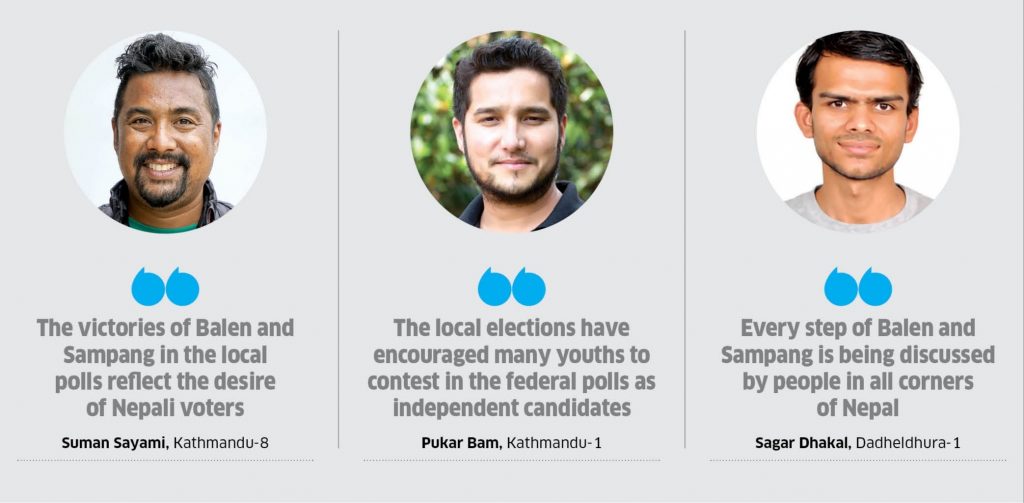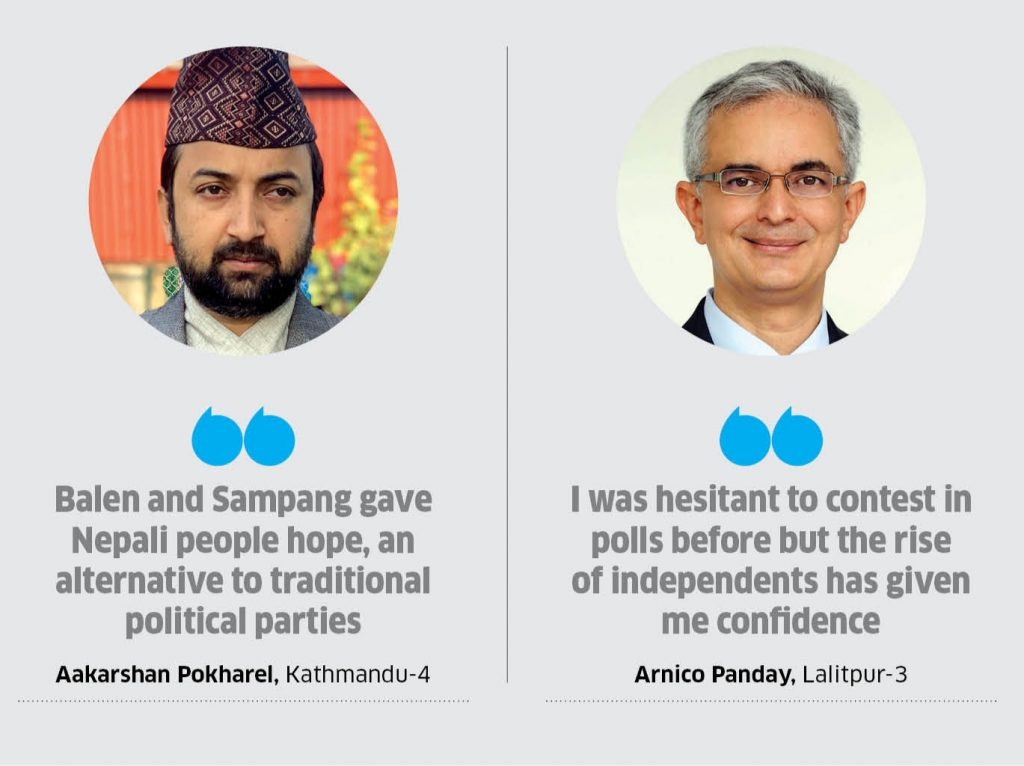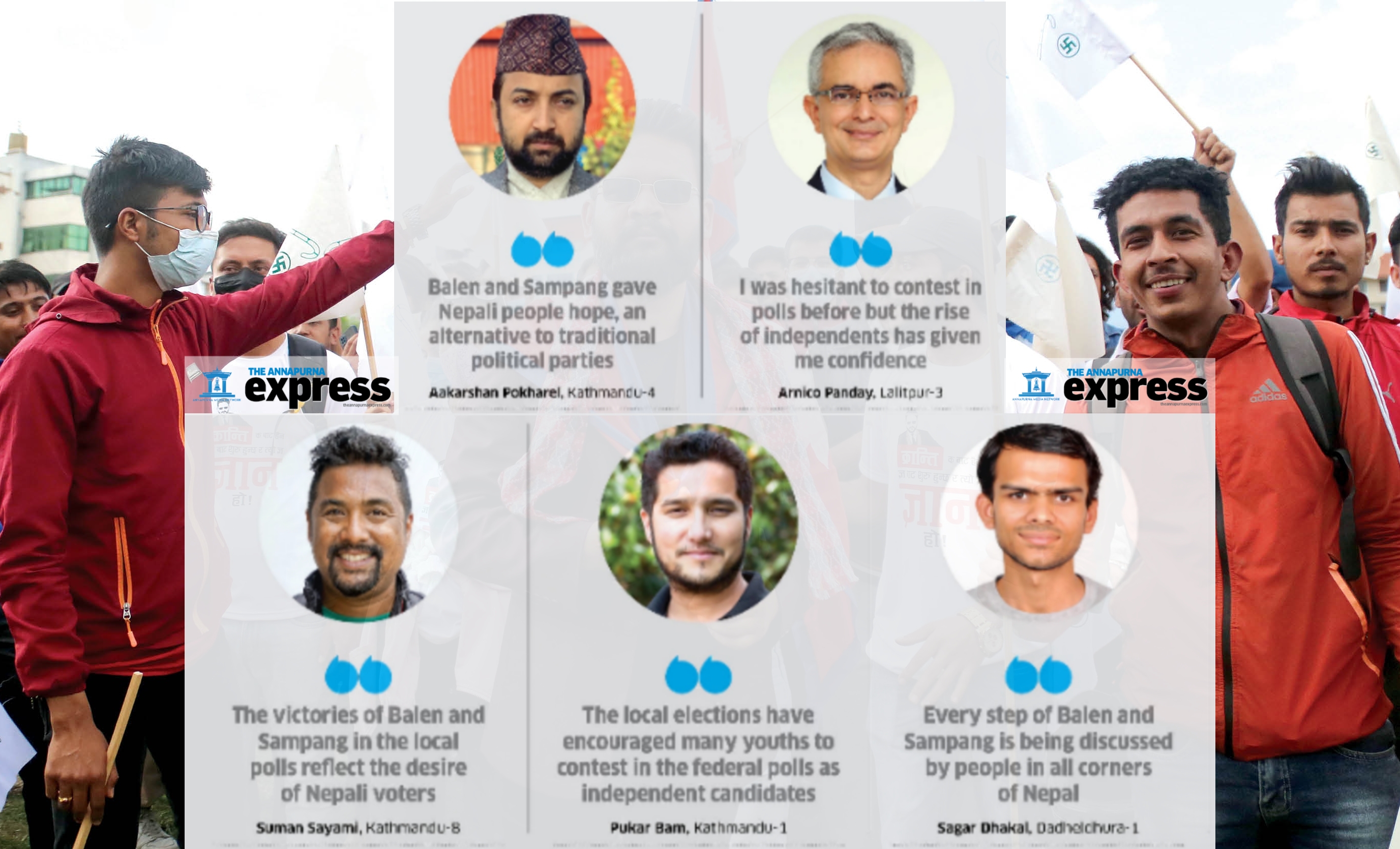On Aug 29, CPN (Maoist Center) Chairman Pushpa Kamal Dahal said at a public function that his party was seeking candidates who could gain sentimental votes in the November 20 elections to the federal and provincial assemblies. “Balen won the same way,” he said, referring to the unprecedented victory of the incumbent Kathmandu mayor in the May 13 local polls.
The rapper turned independent mayoral candidate, Balendra Shah had defeated the candidates from major political parties. Following Dahal’s remarks, there was a rumor that the Maoist party was considering Kulman Ghising, managing director of Nepal Electricity Authority, who is credited for resolving the problem of perennial power cuts in the country, as one of its candidates for the November polls. Ghising has since refuted the rumor, but there is a deep significance to Dahal’s statement.
Call it ‘Balen effect’ or ‘Sampang effect,’ many young and educated people have declared their independent candidacies for the November elections, and the old-established parties feel unsettled. The groundswell of urban voters’ support to independent candidates in the May election has made parties realize they cannot risk fielding political stooges and placement in the upcoming polls.
Suman Sayami has declared his candidacy for a federal parliament seat from Kathmandu-8. He is a prominent Newa rights activist and heritage conservationist, who had also run as an independent mayoral candidate for Kathmandu Metropolitan City back in May. He says Nepali people want progressive, independent candidates who can establish rule of law and good governance.
“The victory of Balen and Sampang in the local polls reflects the desire of Nepali voters.” Sayami is also the coordinator of ‘Lauro Campaign’, a loose alliance of independent candidates who have been lobbying to get ‘Lauro’, the election symbol of Balen and Sampang, as their election symbol for the November polls. Pukar Bam, another independent candidate from Kathmandu-1, says the outcome of local elections in cities like Kathmandu and Dharan show that people are tired of traditional political parties.
“The local elections have encouraged many young people to contest in the federal elections as independent candidates,” he adds. Bam was a campaigner for the ‘Enough is Enough’ protest movement against the KP Oli government’s poor handling of the Covid-19 pandemic. He believes there is a good winning probability for independent candidates after they have agreed to form alliances in some constituencies. “Previously, there were over two dozen independent groups who were planning to contest the upcoming elections,” says Bam. “After we agreed to forge alliances, the number has come down to three.”  Sagar Dhakal is another hopeful independent candidate, who has declared his candidacy from Dadeldhura-1, the hometown of Prime Minister Sher Bahadur Deuba. Dhakal, who came to limelight after a heated exchange with Deuba on live TV in 2017, is a hydro-mechanical engineer by profession. He says Balen and Sampang have offered hope to Nepali people that all is not lost. “Every step of Balen and Sampang is being discussed by people in all corners of Nepal,” he says.
Sagar Dhakal is another hopeful independent candidate, who has declared his candidacy from Dadeldhura-1, the hometown of Prime Minister Sher Bahadur Deuba. Dhakal, who came to limelight after a heated exchange with Deuba on live TV in 2017, is a hydro-mechanical engineer by profession. He says Balen and Sampang have offered hope to Nepali people that all is not lost. “Every step of Balen and Sampang is being discussed by people in all corners of Nepal,” he says.
“This is entirely a new phenomenon and it gives hope and encouragement to independent candidates.” Political analyst Lok Raj Baral has a different thought regarding the rise in independent candidates. He says there is a significant difference between local and federal elections.
“Yes, the effects of Balen and Sampang’s victory in the local elections might sway some voters to pick independent candidates, but it cannot make that much of a difference to hurt the established parties.” He believes that if someone is going to change Nepali political culture that is independent groups who are not affiliated to any established political parties. Aakarshan Pokharel, a civil engineer turned politician has already announced his candidacy in Kathmandu-4, against the general secretary of the Nepali Congress Gagan Thapa.
“Balen and Sampang gave Nepali people a hope, an alternative to traditional political parties,” says Pokharel. “These two mayors are being widely hailed by the public. The perception of voters towards independent candidates has changed.” Arnico Panday, an independent candidate from Lalitpur-3, also gives credit to Balen and Sampang for his decision to run in the November elections. “I had thought of contesting in parliamentary elections before, but I was hesitant then. The rise of independent candidates has given me confidence.”
Panday is an expert on environmental science and public policy. It is important for Panday and his fellow candidates that Nepali people outvote the old, outdated political candidates. They want the candidates with a clear vision to win, not those with unnecessary political agendas. “Nepal needs people-centric leaders.” Balen and Sampang have also proved that election campaigning should not necessarily be an expensive affair. They believe that the most important thing is for the candidate to connect with the voters by visiting their homes and neighborhoods. “I am not in favor of expensive election campaigns and promotion,” says Dhakal. “I am instead visiting the communities in my constituency and explaining my agendas to them.”  Anthropologist Laya Prasad Uprety says the wave of independent candidacies in local and national elections is a sign that Nepali voters, mostly youths, are deeply disenchanted with the established political parties. “Since 1990, Nepali political parties have failed to work for the interest of people. And many of today’s young generation see these parties and their leaders as part of the problem,” says Uprety. “That is why we are seeing a rise in independent election candidates.”
Anthropologist Laya Prasad Uprety says the wave of independent candidacies in local and national elections is a sign that Nepali voters, mostly youths, are deeply disenchanted with the established political parties. “Since 1990, Nepali political parties have failed to work for the interest of people. And many of today’s young generation see these parties and their leaders as part of the problem,” says Uprety. “That is why we are seeing a rise in independent election candidates.”
Uprety, however, adds that the global historical precedence suggests that independent candidates could never become an alternative to established political parties. “At the moment, young Nepalis think voting for independent candidates is the way to go, which I wholly support, but in the long run, we need political parties.” Uprety says the voting pattern this time will be different than previous elections, as the result of local elections has projected few independent wins in federal polls. “The established political parties have already realized this. We have to see how they will pick their candidates.”
Manushi Yami Bhattarai, who has been lobbying for her candidacy from Kathmandu-7, is happy with emerging independent candidates. “This trend has rattled the major political parties, which is a good thing.” Bhattarai, who is the daughter of former Prime Minister Baburam Bhattarai, believes if independent candidates were to win in the upcoming elections, political parties will be forced to improve. “I believe in a multi-party democracy, but I also support independent candidates,” she says. “It will help our democracy.”












